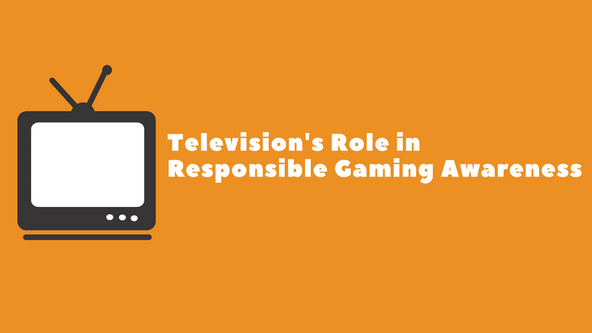Television’s role in responsible gaming awareness
February 22, 2024

Gambling is among the most quickly evolving industries, which is now more accessible than ever. It’s fun and exciting to spin the reel in colourful slots wherever you are, but this entertainment also has drawbacks. The rate of individuals negatively affected by gambling is alarming, so market players initiate varied measures to inform the audience about the potential consequences. Regulatory authorities provide stricter requirements to their licensees, while operators impose limitations for those at risk.
Educating people about the possible harm through the media is another way to increase awareness of this issue. TV ads and programmes are often dedicated to casinos – and viewers are likely to follow what they are recommended. Therefore, implementing more data on responsible gambling is essential to encourage a healthy approach to this risky pastime.
The Power of Visual Media
By definition, most potential casino players find out about this entertainment online. Most iGaming companies promote themselves through social networks and digital ads of related websites. However, television remains a source of information for millions of people, which is why broadcasters should be careful with what they convey to their audiences.
Visual storytelling is a real art, as it implies transferring important messages for deeper viewers’ perception. Such an approach is beneficial, as it really works: the audience can easily understand and memorize the necessary details. Therefore, simply repeating “Gambling is addictive” would hardly bring the anticipated results. However, placing information about responsible gaming among other exciting facts and stories is the way to capture people’s attention and excite them about the discussed topic.
Public Service Announcements (PSAs)
PSAs were initially created to increase public awareness of a particular issue. These little videos aim to inform users of something important and catch their attention from the first second. For instance, a special Public Service Announcement was launched by OASAS during the Problem Gambling Awareness Month. The one-and-a-half-minute film provides details of all potential risks and ways to eliminate them. This PSA effectively conveys the message to the viewer and creates a lot of noise. More similar videos should be implemented for users to learn about gambling-related harms on TV.
Integration in Programming
The number of varied TV programmes is growing, so adding the safer gambling concept is not complicated. Many people in the UK and beyond are excited about the casino topic, desire to learn more about the industry. Therefore, special shows or gambling movies are in demand among the audience. TV channels can increase awareness by inviting compulsive players to tell their stories or experts to discuss the possible consequences of ignoring compulsive behaviours. Currently, television programs are not just a way to have fun and relax – but also a powerful tool in promoting important details and tools for safer gambling.
Advertising Standards and Regulations
Requirements for companies promoting themselves on TV vary depending on the country. However, gambling addiction is a global challenge, so multiple governments, including the UK, have already implemented appropriate limitations for casino and betting ads. While these advertisements are still not prohibited, operators are required to increase user awareness of gambling-related harms. Therefore, every ad should contain no less than 20% of content encouraging responsible behaviours on gaming and betting platforms. In such a way, potential players can learn about the best destinations to have fun and find out more about the possible risks.
The UK gambling sector boasts the strictest regulations, as its controlling body aims to provide a secure and transparent environment for everyone engaged in the industry. All domestic casinos and bookmakers must be covered by GamStop self-exclusion. The programme restricts access to risky platforms and allows users to take time for appropriate treatment.
However, many players prefer to avoid this tool by choosing sites that aren’t on GamStop with more flexibility and fewer limitations. In this case, they have to develop a healthy approach to online gaming, where the media comes in handy. It’s important for casino ads to provide fair and trustworthy details. For instance, promoting the possibility of gambling for free when investments are still required is prohibited. Giving false information can lead to fines or complete bans for advertisement on TV, so gambling companies should learn all the requirements before launching their promotional campaigns. All these standards are created to motivate users to play responsibly and know what to do if noticing the first signs of compulsive behaviours.
Impact and Effectiveness
Undeniably, the media affects people’s perception of different points, and online casinos are no exception. Gambling operators and regulatory authorities initiate numerous campaigns, often engaging celebrities, to promote responsible gaming. Regular notifications about safer gaming encourage users to reconsider their actions and stick to recommendations to get the best experience and avoid potential problems.
According to research, the UK now has one of the lowest gambling addiction rates globally (0.3 per cent), but it’s only the official statistics. Some people are unwilling to speak about the issue or confirm they suffer from compulsive disorders. Therefore, more campaigns on increasing player awareness should be initiated in numerous media, including television programs.
Final Thoughts
Compulsive gambling is the primary industry challenge all market players have yet to overcome. Informing users through social media about potential harmful consequences is essential for creating a healthy approach to this risky entertainment and investing in the overall society’s well-being. Therefore, gambling companies and regulatory authorities initiate special campaigns to promote responsible gaming. The media is a powerful tool for conveying critical messages to the audience – and television plays a huge role in multiple initiatives.
